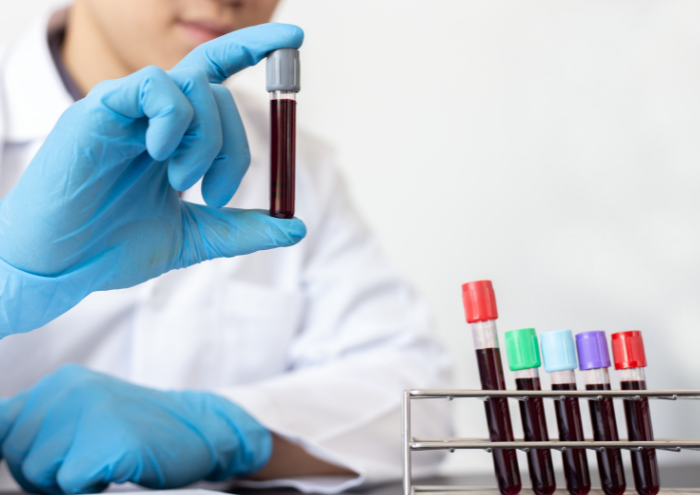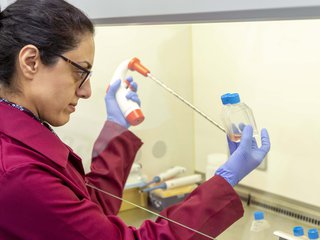Can a blood test detect cancer?
You might have recently seen news suggesting that a blood test could accurately identify cancer months before a person starts to get any symptoms. Here's what we know about the test and what it might mean for people with blood cancer.

What is this blood test and how exactly does it work?
Many people with cancer are subject to many tests and procedures in order to be diagnosed, which can take time and can be invasive. In an ideal world, we’d have a tool that could simply identify if someone has cancer. Ideally, it would also be able to pick up the cancer at an early stage so that we could have the best chance of treating the disease successfully. This isn’t something we have at the moment, but it might not be as far off as you think.
A new test has been created which aims to diagnose cancer using a blood test. This test works by looking for something in the blood called 'cell-free DNA (cfDNA)', which are pieces of DNA that a tumour releases into the bloodstream. You might have heard these tests being referred to as 'liquid biopsies'. This is similar to blood tests that are used to confirm whether women are pregnant.
In pregnancy, the unborn baby releases some of their DNA into the mother’s bloodstream, which can be picked up using a blood test.
We know that cancer cells grow in numbers rapidly, and as this happens, some cells will die. When this happens, pieces of tumour DNA are released into the blood. This test works by taking a sample of blood to look for these pieces of DNA and feeding the samples into a computer to analyse.
What research has been done?
A recently published study found that one of these tests is capable of identifying over 50 types of cancer, and can give information on whether someone has cancer, and where that cancer is.
This study looked at 4,077 people altogether, comprising of 2,823 people with cancer and 1,254 without. Of the 2,823 people who had already been diagnosed with cancer, the test accurately identified these cancers in 51.5% of people.
This might seem low on the surface of things, but that could mean that 50% of people get their cancer picked up earlier than they would have done otherwise. Thus, allowing them to start treatment quickly and giving them the best possible chance of survival.
When this test was used in the group of 1,254 people without cancer, the test accurately identified that these individuals didn’t have cancer in 99.5% of cases. This means the 'false positive' rate – the rate of which the test shows someone has cancer when they actually don’t – is only 0.5%.
How early can this blood test detect cancer?
It’s estimated that detecting cancers before they reach stage IV may reduce cancer deaths. Unfortunately, at the moment, this test doesn’t seem particularly good at picking up early stage cancer, and only correctly identified 16.8% of stage I cancers.
However, it successfully identified 77% of stage III cancers, which gives clinicians the opportunity to start treating people as soon as possible.
Which blood cancers did the study look at?
The study included people with acute lymphoblastic leukaemia (ALL), acute myeloid leukaemia (AML), chronic lymphocytic leukaemia (CLL), chronic myeloid leukaemia (CML), myeloma and people with lymphomas. The results were most impressive in people with myeloma, with the test successfully identifying 72.3% of cancers, and a high percentage of stage I cancers.
What happens now?
The plan now is to use this test in the real world. So far, studies have been designed where someone has already been diagnosed with cancer, and seeing whether the test can correctly identify those cases.
In order for it to be useful, we need it to work as a screening tool that would enable it to pick up cancers that haven’t yet been diagnosed. Here's some research looking into this:
A research study called SIMPLIFY
In the UK, a similar study will take place in Oxford called SIMPLIFY. This will start by recruiting 6,000 people who have been referred for tests to see if they have cancer. If this blood test is useful at diagnosing cancer, this trial will be expanded to include 25,000 people.
The NHS Galleri trial
In addition to SIMPLIFY, the NHS are piloting the test in a trial called the NHS Galleri trial, which will screen 140,000 people for cancer using the test. The trial will invite people between the ages of 50 and 77 who have not been diagnosed with, or treated for, cancer in the past three years.
Most of these people will be identified randomly by NHS Digital and will then be invited to take part. In comparison to the SIMPLIFY trial, no one recruited to the Galleri trial is suspected to have cancer. This trial will be the first to use the test as a 'screening tool', and will see whether the blood test works in people who are asymptomatic of cancer.
Blood samples will be collected every year over a two year period. Results are expected to be available in 2023. Currently, around 50% of cancers diagnosed by the NHS are stages I or II.
The goal is to detect more cancers in these early stages and increase that figure to 75% by 2028. It’s hoped that this test might help them to achieve this.
The Galleri trial will be the first to really demonstrate the utility of this test in a real-world setting. We’ll keep you updated with findings from the trial as and when they come.
If you have any worries or questions about blood cancer and/or the impact of coronavirus, please don't hesitate to get in touch with our free, confidential support team.

Fund blood cancer research
The day we beat blood cancer is now in sight, but we need your help to get there.
